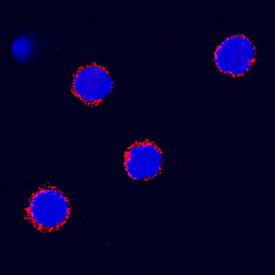Canine SCF/c-kit Ligand Antibody Summary
Lys26-Ala190
Accession # Q06220
Applications
Canine SCF/c-kit Ligand Sandwich Immunoassay
Please Note: Optimal dilutions should be determined by each laboratory for each application. General Protocols are available in the Technical Information section on our website.
Scientific Data
 View Larger
View Larger
Cell Proliferation Induced by SCF/c‑kit Ligand and Neutralization by Canine SCF/c‑kit Ligand Antibody. Recombinant Canine SCF/c-kit Ligand (Catalog # 2278-SC) stimulates pro-liferation in the TF-1 human erythroleukemic cell line in a dose-dependent manner (orange line). Proliferation elicited by Recombinant Canine SCF/c-kit Ligand (5 ng/mL) is neutralized (green line) by increasing concentrations of Goat Anti-Canine SCF/ c-kit Ligand Antigen Affinity-purified Polyclonal Antibody (Catalog # AF2278). The ND50 is typically 0.1-0.3 µg/mL.
 View Larger
View Larger
SCF/c‑kit Ligand in Canine PBMCs. SCF/c-kit Ligand was detected in immersion fixed canine peripheral blood mononuclear cells (PBMCs) using Goat Anti-Canine SCF/c-kit Ligand Antigen Affinity-purified Polyclonal Antibody (Catalog # AF2278) at 15 µg/mL for 3 hours at room temperature. Cells were stained using the NorthernLights™ 557-conjugated Anti-Goat IgG Secondary Antibody (red; Catalog # NL001) and counterstained with DAPI (blue). Specific staining was localized to plasma membrane. View our protocol for Fluorescent ICC Staining of Non-adherent Cells.
Reconstitution Calculator
Preparation and Storage
- 12 months from date of receipt, -20 to -70 °C as supplied.
- 1 month, 2 to 8 °C under sterile conditions after reconstitution.
- 6 months, -20 to -70 °C under sterile conditions after reconstitution.
Background: SCF/c-kit Ligand
Canine SCF (stem cell factor; also known as c‑kit ligand) is a type I transmembrane (TM) glycoprotein that plays an important role in a number of fetal and adult developmental processes (1‑4). It is synthesized as a 274 amino acid (aa) precursor that contains a 25 aa signal sequence, a 190 aa extracellular region, a 23 aa TM segment and a 36 aa cytoplasmic tail (5). Within the extracellular region there are four potential N‑linked glycosylation sites, two intrachain disulfide bonds, and four alpha ‑helices. Although the predicted molecular weight is 19 kDa, the native molecule is anywhere from 28‑40 kDa in size and reflects both N‑ and O‑linked glycosylation (1). Glycosylation is not necessary for bioactivity (6). The transmembrane form of SCF can be cleaved proteolytically, generating a 165 aa soluble form. Circulating SCF exists as both a monomer and nondisulfide‑linked homodimer, with monomer predominating (50% to 75%) (6). Both the soluble and TM forms have bioactivity. Their principal targets may be different, however (7). A second, alternate splice short form of SCF has been identified in other species (1). It is membrane bound but lacks the proteolytic cleavage site found in the long form. Thus, it cannot give rise to a soluble molecule. No such isoform has been reported for canine, but it could be assumed to exist. The ratio of long form to short form varies from tissue to tissue (1). Soluble canine SCF shares 88%, 93%, 86%, 83%, 76%, 76%, 86% and 88% aa sequence identity with porcine, feline, bovine, human, mouse, rat, goat and equine SCF, respectively. Cells known to express SCF include endothelial cells, fibroblasts and keratinocytes (1).
- Broudy, V.C. (1997) Blood 90:1345.
- Nakagawa, S. and T. Kitoh (2000) Curr. Opin. Hematol. 7:133.
- Yoshida, H. et al. (2001) J. Invest. Dermatol. Symp. Proc. 6:1.
- Kang, J. and S.D. Der (2004) Curr. Opin. Immunol. 16:180.
- Dunham, S.P. and D.E. Onions (1996) DNA Seq. 6:233.
- Hsu, Y-R. et al. (1997) J. Biol. Chem. 272:6406.
- Kapur, R. et al. (1998) Blood 91:879.
Product Datasheets
FAQs
No product specific FAQs exist for this product, however you may
View all Antibody FAQsReviews for Canine SCF/c-kit Ligand Antibody
There are currently no reviews for this product. Be the first to review Canine SCF/c-kit Ligand Antibody and earn rewards!
Have you used Canine SCF/c-kit Ligand Antibody?
Submit a review and receive an Amazon gift card.
$25/€18/£15/$25CAN/¥75 Yuan/¥2500 Yen for a review with an image
$10/€7/£6/$10 CAD/¥70 Yuan/¥1110 Yen for a review without an image



